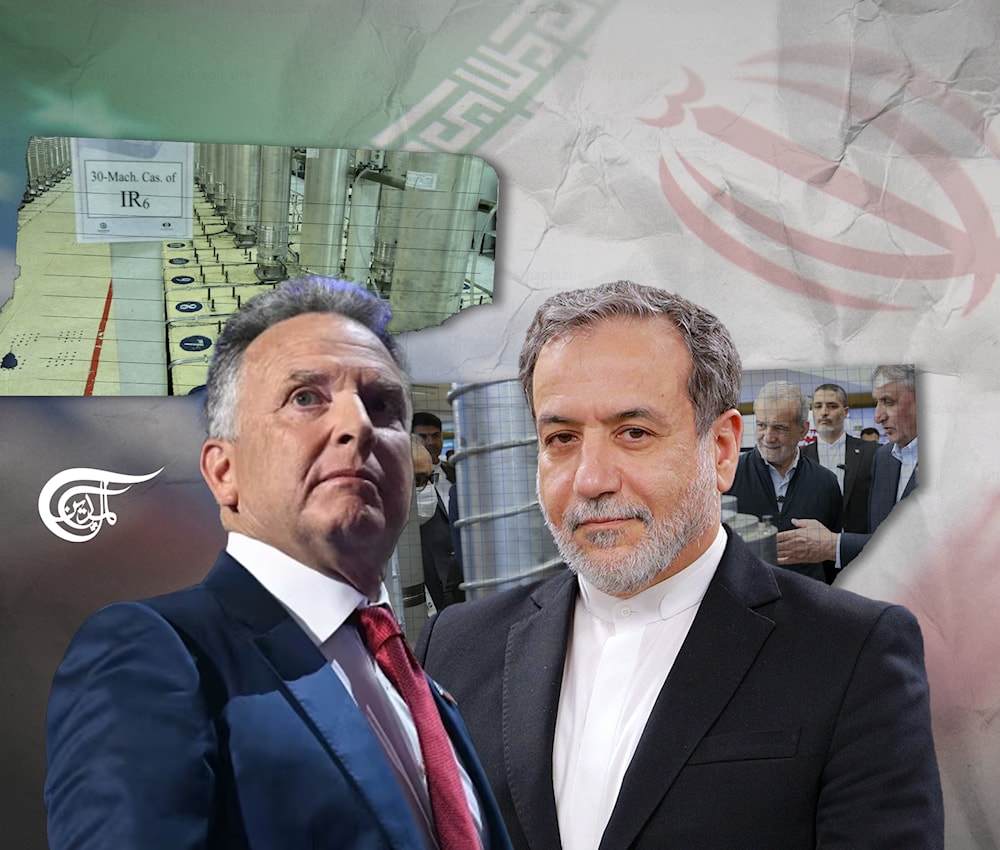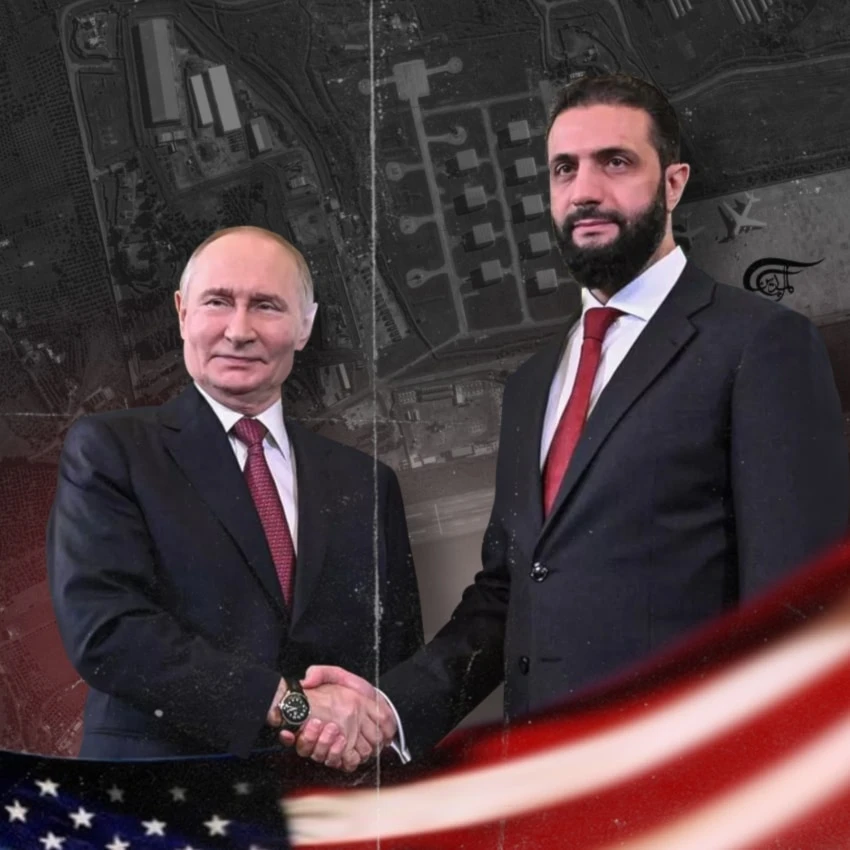The Nuclear Calculus: Strategic Prospects and Subtle Perils
US-Iran nuclear talks show cautious progress amid global rivalries, regional realignments, and attempts at diplomatic sabotage, testing whether diplomacy can outlast those who fear its success.
-

Amid this strategic pivot, the Middle East remains a dynamic arena, layered with regional complexities and global echoes (Illustrated by Mahdi Rteil to Al Mayadeen English)
The U.S.-Iran nuclear negotiations are advancing cautiously through a landscape strewn with strategic peril and fleeting opportunities. The second round of talks in Rome marked a notable shift toward progress, producing unexpectedly positive signals. Yet these developments unfold against a backdrop of global instability. No regional file—especially the Iranian nuclear dossier—can be separated from the broader turbulence reshaping international affairs.
According to The Wall Street Journal, President Donald Trump is preparing to ask over 70 countries to restrict China’s commercial access, signaling a new phase in the global rivalry. This move illustrates a recalibrated U.S. foreign policy, where every international file, including Iran’s, is reframed within the larger confrontation with Beijing. Despite hints of a possible trade agreement, Trump’s approach remains dualistic: nations must choose between America and China. Should negotiations stall or adversarial actions escalate, the next options—military containment and economic blockade—loom closer.
A Shifting Strategic Theater
Amid this strategic pivot, the Middle East remains a dynamic arena, layered with regional complexities and global echoes. A significant disclosure by The New York Times revealed that Washington has twice blocked Israeli plans to attack Iran’s nuclear facilities—first under Biden, then under Trump. The timing of this revelation is not coincidental; it serves as calculated pressure on Tehran, days after Trump confirmed that military options remain "on the table," possibly in coordination with Israel.
This dual messaging—diplomatic engagement laced with military threats—is part of Washington's effort to pressure Iran into concessions while portraying Trump as a pragmatic negotiator. Israel's role here is instrumental rather than independent; its saber-rattling bolsters American leverage while reinforcing Trump’s domestic image as a dealmaker who still holds a big stick.
Rome Talks and Strategic Ambiguity
Iran’s agreement to shift the talks to Rome, while retaining Oman’s discreet mediation, reflects Tehran’s openness to broader European involvement. Europe, which continued to uphold parts of the JCPOA after Trump’s 2018 withdrawal, now holds a pivotal role, especially regarding sanctions relief—Tehran’s foremost priority.
However, the nuclear file cannot be isolated from Iran’s ballistic missile program and regional influence. Western negotiators insist on limits to missile delivery systems capable of carrying nuclear payloads—arguing that deterrence must be pre-emptive, not reactive.
Tehran, meanwhile, asserts that it has no intention to produce nuclear weapons. Yet, its acquisition and testing of hypersonic missiles—particularly in Iran and Yemen—suggest that the threshold of strategic deterrence may already have been crossed. For Western negotiators, this shifts the conversation from preventing hypothetical futures to containing actual capabilities.
Iran, for its part, relies on a strategy of “constructive ambiguity.” It deliberately reveals only parts of its capabilities to maintain diplomatic leverage while avoiding further sanctions. This ambiguity is not a sign of weakness but of strategic calculation: full transparency might make Iran more vulnerable, not safer.
Regional Geometry: Saudi-Iranian Rapprochement and Russian Guarantees
Amid this complex environment, a notable thaw has emerged between Iran and Saudi Arabia. The visit of Saudi Defense Minister Khalid bin Salman to Tehran marked a continuation of the 2023 Beijing accord and signaled an intent to de-escalate bilateral tensions, even as divergences over issues like Palestine persist.
Iranian military officials, including Chief of Staff Mohammad Bagheri, praised Riyadh’s stance on Gaza, indicating a possible recalibration of alignments in the Gulf. Simultaneously, Tehran has been consolidating its strategic partnership with Moscow. Iranian Deputy Foreign Minister Abbas Araghchi delivered a personal message from Supreme Leader Khamenei to President Putin, reaffirming Iran’s red lines on uranium enrichment and proposing intensified coordination on regional and international issues.
For Russia, maintaining strong ties with Tehran is a geopolitical imperative. Moscow sees Iran not only as a key regional actor but as a necessary counterweight to Western influence in the Middle East. At the same time, Russia cultivates close relations with Saudi Arabia, Qatar, and the broader Gulf—a balancing act it has executed with considerable finesse.
Iran’s outreach to Russia ahead of any possible agreement with the U.S. is both tactical and symbolic. It seeks to ensure that its strategic axis with Moscow remains intact, regardless of what transpires in Rome or Washington. This reflects a broader recalibration of what constitutes the "international community." No longer synonymous with the West, the emerging global order now demands multipolar engagement—and Iran is positioning accordingly.
As European Commission President Ursula von der Leyen recently observed, "The West we knew just months ago no longer exists." Iran’s pursuit of Russian guarantees—possibly as co-guarantor of a future nuclear deal—emerges directly from this recognition.
Gas Diplomacy and the Qatari Nexus
Another regional player is adjusting its posture. Qatari Emir Tamim bin Hamad Al Thani’s visit to Moscow—the first since 2018—comes amid extreme volatility in global energy markets and Western-Russian tensions. Doha, traditionally balancing its ties between East and West, now appears to be hedging its bets in a world rapidly moving toward a post-Western configuration.
The visit highlights a broader regional realignment, as states seek to define their place in a new global architecture shaped not by stability, but by layered crisis and shifting power.
Israeli Interference: A Gamble in Paris
On the eve of the Rome talks, an Israeli delegation—composed of Strategic Affairs Minister Ron Dermer and Mossad Chief David Barnea—secretly traveled to Paris to meet Trump’s envoy Steve Witkoff. Their mission, according to Axios, was to derail the negotiations. The timing—just 24 hours before the second Rome session—suggests an urgent effort to inject doubt and sabotage the diplomatic track.
Their argument likely leaned on alarmist narratives: Iran’s nuclear program is near weapons-grade enrichment, and the IAEA itself has hinted at proximity to breakout capacity. The intention may have been to alter Witkoff’s psychological orientation, subtly shifting him from open-minded mediator to skeptical adversary.
But the attempt may have misfired.
Trump, known for jealously guarding his personal initiatives, could interpret such interference as encroachment. This misstep might accelerate the diplomatic process instead of halting it. Iran, sensing this dynamic, briefed Moscow on the situation, clearly seeking Russian backing to buffer against sabotage.
Moscow, for its part, holds unique leverage. With deep ties to both Trump and Tehran, it stands as one of the few actors capable of steering the process toward resolution. Iran’s decision to involve Russia more deeply in this stage of talks underscores how far-reaching the consequences of this negotiation may become.
Conclusion: Between Strategic Depth and Disruption
The nuclear deal now teeters between strategic opportunity and tactical sabotage. Its success hinges not only on diplomatic skill but on navigating a minefield of external interference and internal mistrust. The battle is not only between Washington and Tehran, but among those who seek resolution and those who fear its implications.
Should the deal collapse under the weight of sabotage, the result will not simply be another diplomatic failure. It could recalibrate regional security, global alignments, and the strategic credibility of the United States itself.
In the final analysis, the question is no longer whether an agreement is possible. The real question is: can it survive those who fear peace more than war?

 Mohamad Seifeddine
Mohamad Seifeddine
 7 Min Read
7 Min Read









